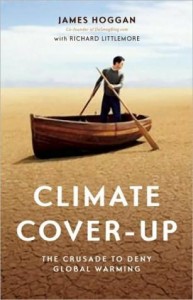Bfgrn-- I am not denying that human activity has had an impact on CO2 levels and the climate. I am skeptical of the importance of it. The earth has been much warmer and much cooler, had more CO2 and less. Much like the human body has homeostasis, so does the earth. The advocates for global warming have done themselves a disservice having dopes like Al Gore preaching incorrect data and acting like chicken little. There is a lot of bad science and overstating of the case for AGW. It pisses me off when I am lied to for no reason. And it pisses me off that so many people are taken in by shoddy work and a glib speech. Again, I am not denying that the climate is changing, just the importance of our part in it, and perhaps more importantly, our ability to do anything about it.
I think you need to apply the same skepticism and scrutiny to the deniers.
They made their motives very clear in 1988...and it is NOT based on science or an honest attempt to ascertain the truth about climate change; it is a PR propaganda campaign and a war room plan...
--------------------------------------
The material below contains a memo by the API (America Petroleum Institute) from April 1998.
Global Climate Science Communications
Action Plan
Project Goal
A majority of the American public, including industry leadership, recognizes that significant uncertainties exist in climate science, and therefore raises questions among those (e.g. Congress) who chart the future U.S. course on global climate change.
Progress will be measured toward the goal. A measurement of the public's perspective on climate science will be taken before the plan is launched, and the same measurement will be taken at one or more as-yet-to-be-determined intervals as the plan is implemented,
Victory Will Be Achieved When
* Average citizens "understand" (recognize) uncertainties in climate science; recognition of uncertainties becomes part of the "conventional wisdom"
* Media "understands" (recognizes) uncertainties in climate science
* Media coverage reflects balance on climate science and recognition of the validity of viewpoints that challenge the current "conventional wisdom"
* Industry senior leadership understands uncertainties in climate science, making them stronger ambassadors to those who shape climate policy
* Those promoting the Kyoto treaty on the basis of extent science appears to be out of touch with reality.
Current Reality
Unless "climate change" becomes a non-issue, meaning that the Kyoto proposal is defeated and there are no further initiatives to thwart the threat of climate change, there may be no moment when we can declare victory for our efforts. It will be necessary to establish measurements for the science effort to track progress toward achieving the goal and strategic success.
Strategies and Tactics
I. National Media Relations Program: Develop and implement a national media relations program to inform the media about uncertainties in climate science; to generate national, regional and local media coverage on the scientific uncertainties, and thereby educate and inform the public, stimulating them to raise questions with policy makers.
Tactics: These tactics will be undertaken between now and the next climate meeting in Buenos Aires/Argentina, in November 1998, and will be continued thereafter, as appropriate. Activities will be launched as soon as the plan is approved, funding obtained, and the necessary resources (e.g., public relations counsel) arranged and deployed. In all cases, tactical implementation will be fully integrated with other elements of this action plan, most especially Strategy II (National Climate Science Data Center).
Identify, recruit and train a team of five independent scientists to participate in media outreach. These will be individuals who do not have a long history of visibility and/or participation in the climate change debate. Rather, this team will consist of new faces who will add their voices to those recognized scientists who already are vocal.
* Develop a global climate science information kit for media including peer-reviewed papers that undercut the "conventional wisdom"on climate science. This kit also will include understandable communications, including simple fact sheets that present scientific uncertainties in language that the media and public can understand.
* Conduct briefings by media-trained scientists for science writers in the top 20 media markets, using the information kits. Distribute the information kits to daily newspapers nationwide with offer of scientists to brief reporters at each paper. Develop, disseminate radio news releases featuring scientists nationwide, and offer scientists to appear on radio talk shows across the country.
* Produce, distribute a steady stream of climate science information via facsimile and e-mail to science writers around the country.
* Produce, distribute via syndicate and directly to newspapers nationwide a steady stream of op-ed columns and letters to the editor authored by scientists.
* Convince one of the major news national TV journalists (e.g., John Stossel ) to produce a report examining the scientific underpinnings of the Kyoto treaty.
* Organize, promote and conduct through grassroots organizations a series of campus/community workshops/debates on climate science in 10 most important states during the period mid-August through October, 1998.
* Consider advertising the scientific uncertainties in select markets to support national, regional and local (e.g., workshops / debates), as appropriate.
National Media Program Budget -- $600,000 plus paid advertising
Global warming: The campaign by the American Petroleum Institute
"Eighty percent of Republicans are just Democrats that don't know what's going on"
Robert F. Kennedy Jr.


